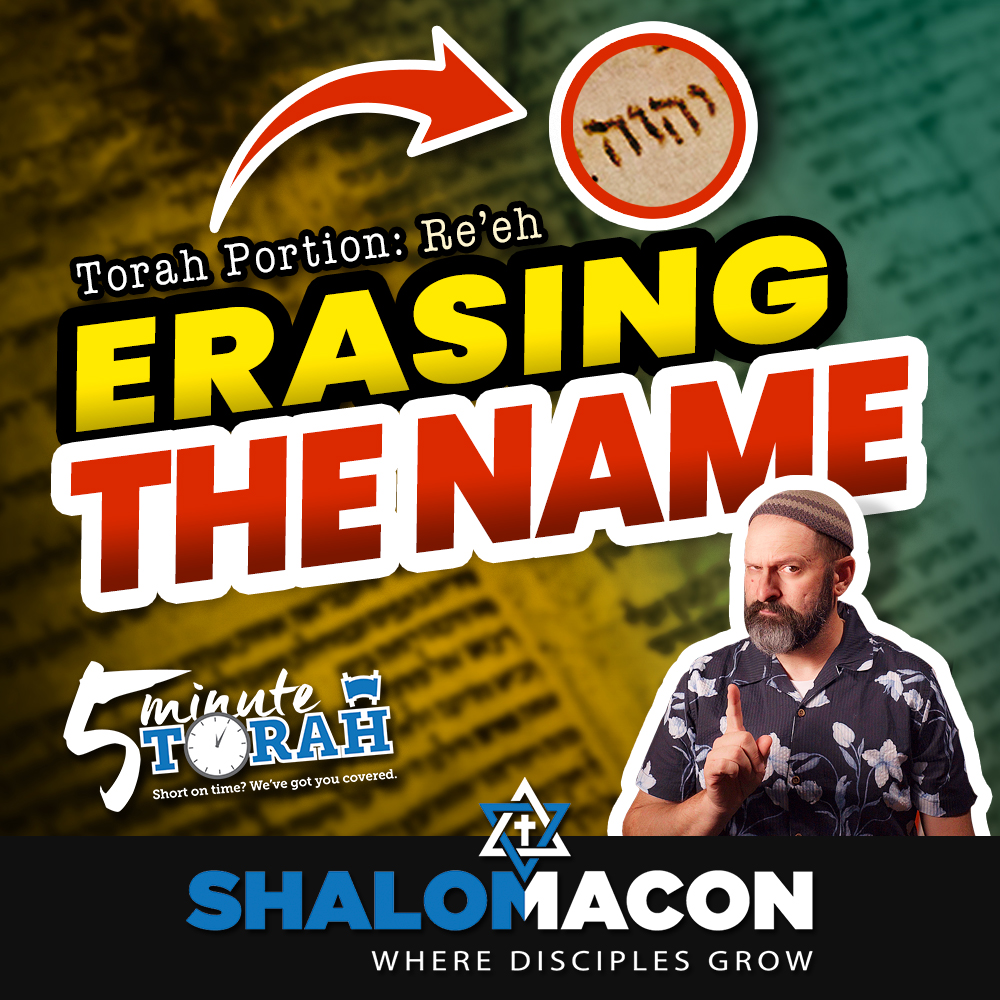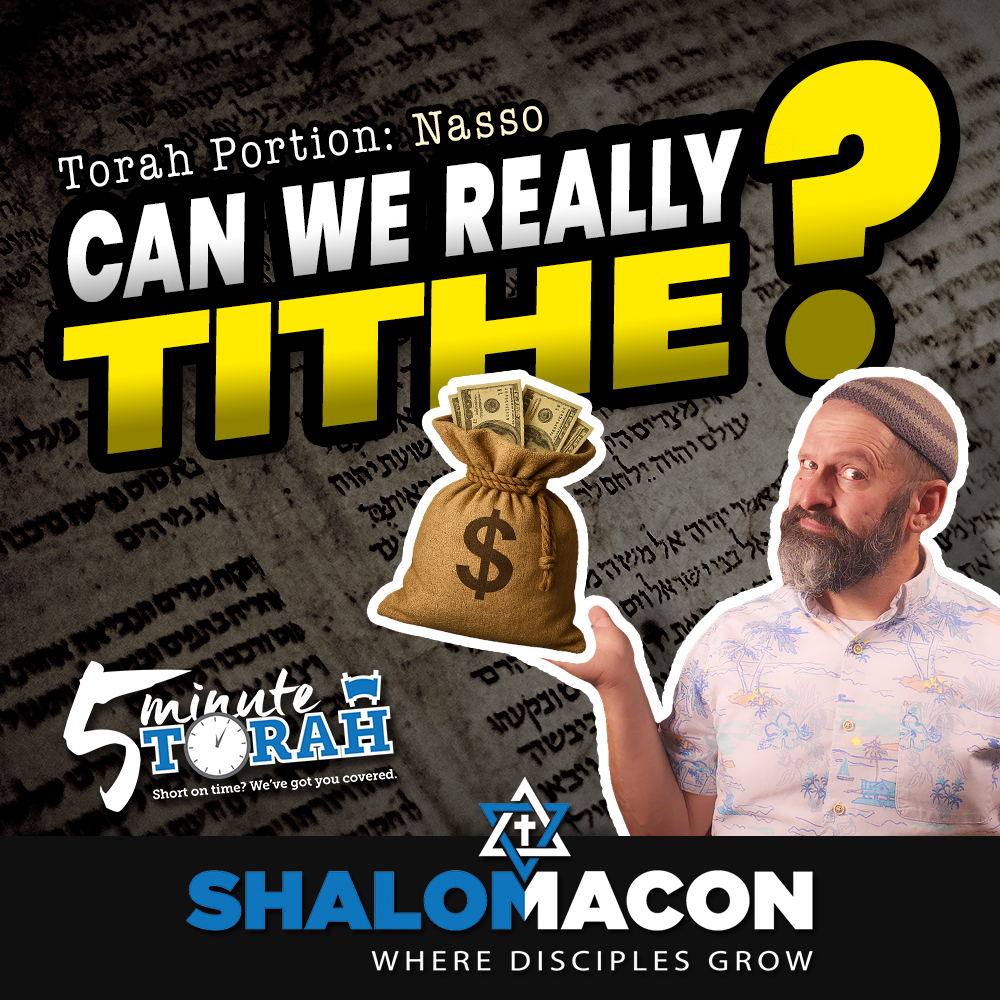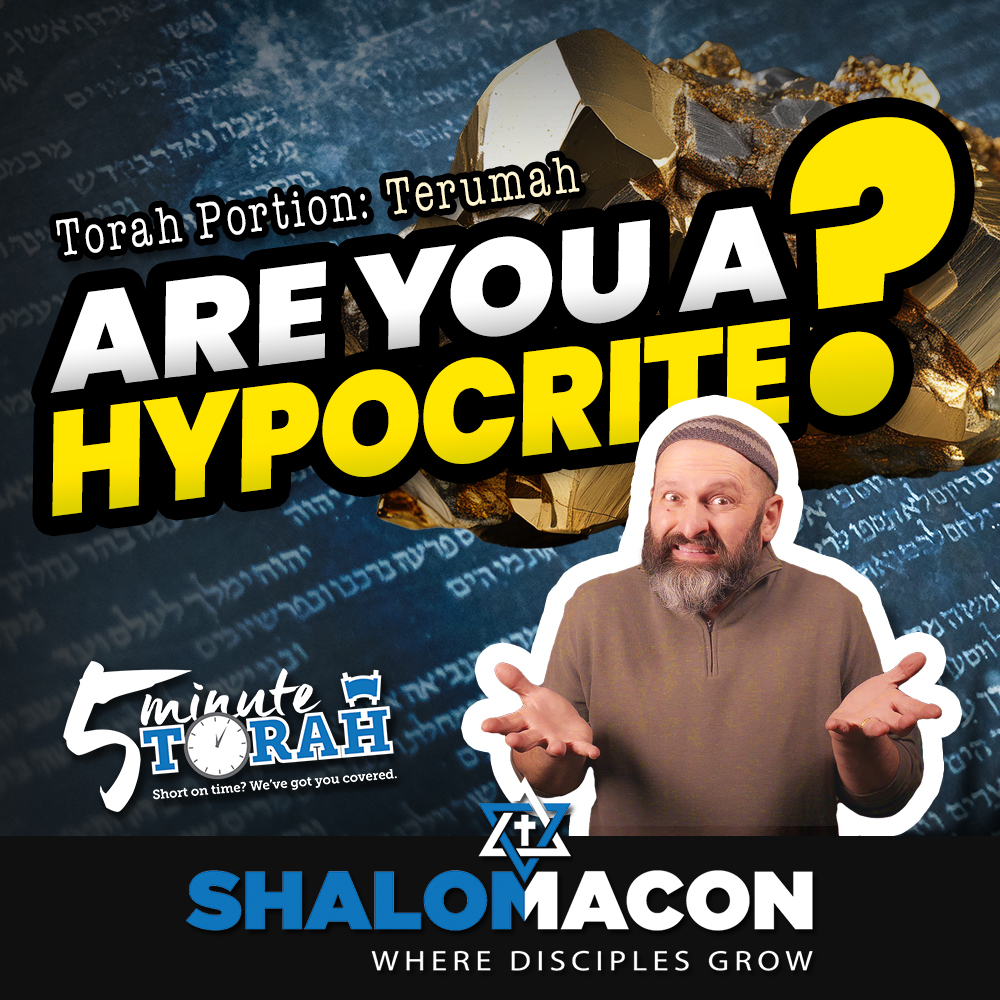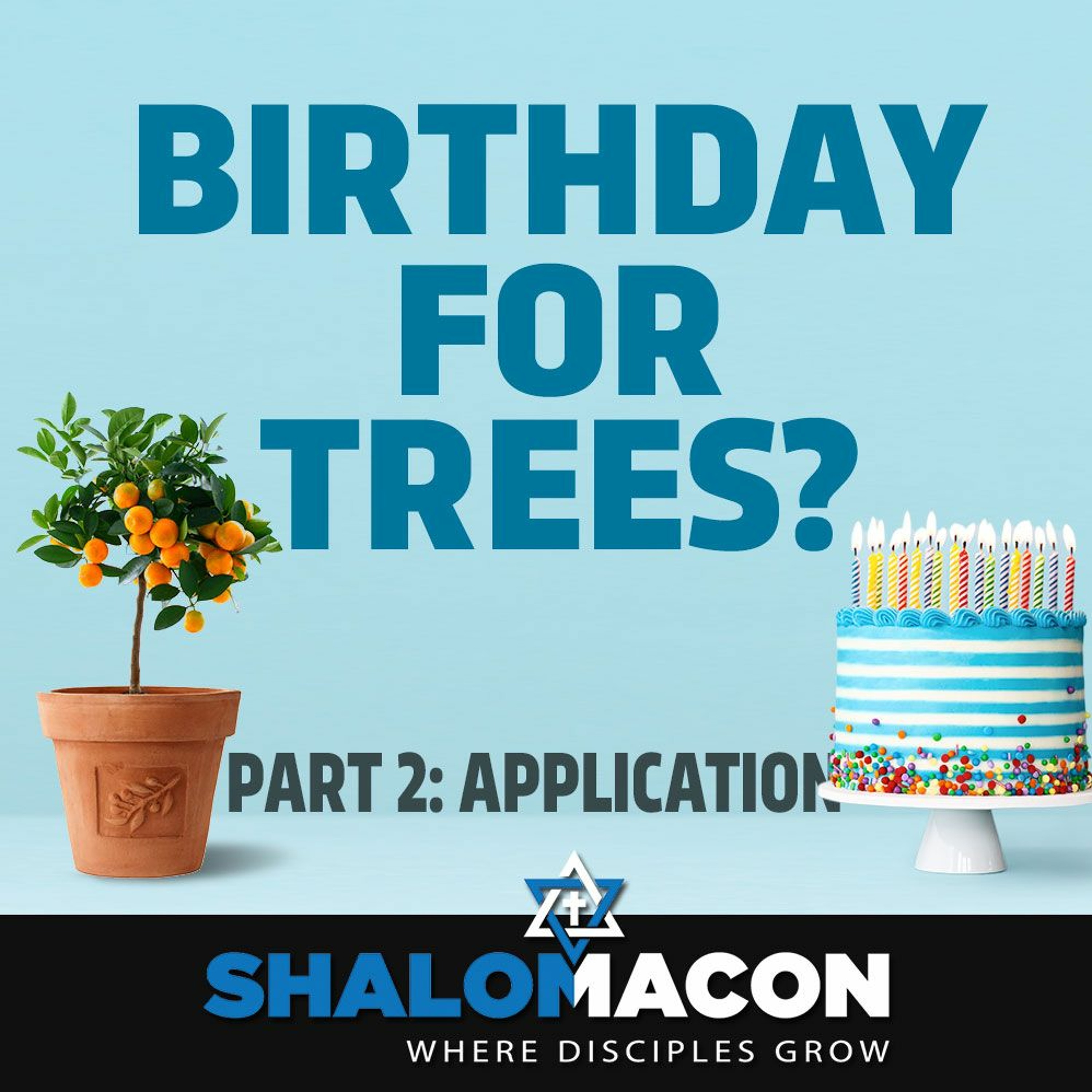Episode Transcript
[00:00:00] The Torah warns us not to erase the name of the Lord. But here's the shocking truth. You don't need ink, fire or stone to erase his name. You can blot it out through hypocrisy. We can smear it through dishonor. We can erase it through the way we live. The sages call this Chelul Hashem, desecrating the Name. And it's just as dangerous today as it was in the time of Moses. Join me to discover how to guard God's name not with just our words, but with our lives in this week's five minute tour.
[00:00:36] Shalom and Blessings from Shalom Macon, the place where disciples of Yeshua learn, connect and grow. I'm Darren and before I get into the five minutes of my five minute Torah commentary, let's cover a few quick facts about this week's Torah portion. This week we are studying the 47th portion of the Torah cycle and the fourth portion of the Book of Deuteronomy. We are in the portion of Re E. Deuteronomy 11:26 through 16:17 and and here are the three things that you need to know about it. Number one blessings and curses the choice before us re begins with the dramatic call to attention. See, I set before you today a blessing and a curse. This is Deuteronomy 11:26. The Israelites are reminded that life is not neutral. Every action carries weight and consequence. Obedience brings blessing, disobedience brings curse. This framing teaches us that God gives us the dignity of choice, but but with it comes accountability. Our covenant relationship with him is active and intentional, requiring us to choose life and walk in his ways each day. Even today, the choices we make, big or small, shape the direction of our spiritual lives.
[00:01:43] 2. God's Place Pilgrimage Festival Details Re not only commands Israel to worship at the place that the Lord will choose, ultimately Jerusalem, but but also adds details about the three great pilgrimage festivals, Pesach or Passover, Shavuot or Pentecost and Sukkot or Tabernacles. Unlike the nations who sacrificed to many gods in many places, Israel was to bring its offering to one central sanctuary. One key instruction forbids offering the Passover lamb anywhere except the Temple in Jerusalem. This is why to this day, in Jewish tradition, we do not eat lamb at the Passover Seder, avoiding even the appearance of making a sacrifice in a way or in a place that the Torah prohibits. This focus on God's chosen place shows us that worship is not about human creativity or convenience, but about aligning ourselves with God's instructions and honoring his holiness in the way he has prescribed. And number three True versus False prophets, idols, and loyalty to God. Re also warns of the dangers of deception through false prophets, dreamers, or even close friends who might entice Israel to worship other gods. See Deuteronomy 30.
[00:02:53] Miracles or persuasive speech are not the measure of truth. Loyalty to the God of Israel is. The people were called to reject every voice that led them away from the Torah, even if that voice came with signs and wonders. This is a sobering reminder that sincerity, charisma, or even power are not substitutes for truth. Our task is to remain faithful to the Lord alone, measuring every claim by His Word and guarding our hearts from influences that would draw us away from Him. What does it really mean to live by the Spirit of the Law and not the letter of the Law? For centuries, believers have been told that the Law of God is a burden and something Yeshua came to set us free from. But what if that's not what the Scriptures say at all? What if Paul's words about the letter of the law killing were never meant to pit God's spirit against his own commandments? In my new book, Spirit of the Law, I take a closer look at the writings of Paul, the teachings of Yeshua, and the Torah itself to uncover a consistent truth. The problem was never God's Law. It was the human heart. And rather than repealing his Father's commandments, Yeshua came to transform our rebellious heart, empowering his disciples to walk in the fullness of the Spirit of the Law. But in order to accomplish this, we first need to understand what it means. If you've ever struggled to reconcile law and grace, Spirit of the Law will open your eyes to a richer, more faithful understanding of both. It will challenge assumptions, bring clarity to misunderstood passages, and invite you into a deeper walk of obedience, one that's alive with the Spirit of God. Pick up your copy today and let the Spirit of the Law transform the way you see God's Word and the way you live it. It may just be the missing key you've been looking for to unlock the Scriptures and open a whole new world of biblical understanding. Once it clicks, you'll want to invite others to join the journey as well. Well, this week's Torah commentary is called Erasing the Name and comes from my book, 5 Minute Torah Volume 3.
[00:04:48] As we have seen many times previously, the Torah has many levels of understanding as well as application. This week's Torah portion is no exception. Toward the beginning of our reading, we learned the Lord's command to the Israelites to obliterate the idols and the high places of the Canaanites when they entered the land given to their ancestors. These are the statutes and rules that you shall be careful to do in the land that the Lord the God of your fathers has given you to possess. All the days that you live on the earth, you shall surely destroy all the places where the nations whom you shall dispossess served their gods on the high mountains and on the hills and under every green tree you shall tear down their altars and dash in pieces their pillars and burn their Asherim with fire you shall chop down the carved images of their gods and destroy their name out of that place. You you shall not worship the Lord your God in that way. This is Deuteronomy 12:1 4 without an understanding that these commandments are for a specific time, a specific place, and a specific people, some may think these instructions equally apply to those of us today living in the United States or other lands in the Diaspora. In their zeal against false gods, they may use these instructions to justify violent and destructive behavior against other religious depictions or practices.
[00:06:06] Since these commandments do not have a universal application, but are relevant only to a specific time, place and people, how can we find any application for us today? The first is according to the way our sages understood the last part of this passage. The last instruction in this section literally reads, you shall not do so to the Lord your God. This is verse four. Why would the children of Israel want to do all of those things they did to the idols Canaan of to their own God? This doesn't make sense. Therefore, the ESV and other modern translations work to smooth this out. They translate it to say something like you shall not worship the Lord your God in that way. They understand it to mean that the children of Israel must destroy the places of idol worship and not learn any pagan practices from them. But many of the sages understand this in a more literal sense and place it back into the immediate context. The end of the previous verse, verse three says, you shall destroy their name out of that place. Please keep in mind that the separation of verses is a fairly modern addition to the text. Thus, these two thoughts can be read together as you shall destroy their name out of that place. You shall not do so to the Lord your God. Because this erasing, marring or destroying the name of God is prohibited. It specifically applies to the Tetragrammaton, the four letter divine name of the Most High Yud and hey and VAV and hey typically represented in English as Y and h and V and h. Around the second century ce this was the common understanding. Targum Yonatan on Deuteronomy translates this verse with this explicit understanding. Not so may you do to blot out the inscription of the name of the Lord your God. This is why we do not write God's sacred and most holy name on things that will eventually be destroyed or discarded by such as notebook paper or T shirts. To do so would bring the most holy Name of God down to a mundane level. It would make it common. The divine Name would essentially be erased once the Name's usefulness came to an end and was discarded. But we can understand this passage in another way. We can blot out the name of the Lord through our actions. How can we do so when we act in a manner that is not fitting for people who represent the God of Abraham, Isaac and Jacob to the world and we reduce his name in their eyes? In effect, we erase it so that they see less and less of the God we claim to represent.
[00:08:35] We have previously discussed how our good works can help sanctify God's name. See Matthew 5:16. But this is a way which we can desecrate God's name. When we do such a thing. It is called chelul hashem or desecrating the Name. We desecrate God's name not only when we literally and physically physically erase it, but also when we misrepresent or dishonor him by our actions. Let us not blot out the name of our God in any manner so that his name may be made great in and through us in this world. Antisemitism within the Church is at an all time high. Sadly, much of it is rooted in centuries of distorted theology, teachings that twisted the words of Yeshua and his apostles into weapons against the very people of Israel. That's why we created our series Baseless the Roots of Christian Antisemitism. In it we uncover where these ideas came from, how they spread through church history, and why they still shape modern Christian theology. This isn't just history. It's happening right now. And unless we confront these lives and half truths, they will continue poisoning hearts, dividing believers and blinding many to the truth of evil. Israel's irrevocable calling. So don't wait. Watch the latest teaching in this series today and share it with others who need to hear this message. The time to expose these lies is now. Just click on the link right here.



